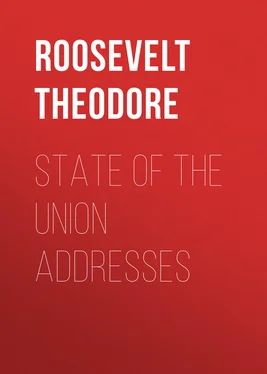Theodore Roosevelt - State of the Union Addresses
Здесь есть возможность читать онлайн «Theodore Roosevelt - State of the Union Addresses» — ознакомительный отрывок электронной книги совершенно бесплатно, а после прочтения отрывка купить полную версию. В некоторых случаях можно слушать аудио, скачать через торрент в формате fb2 и присутствует краткое содержание. Жанр: foreign_edu, Технические науки, Политика, на английском языке. Описание произведения, (предисловие) а так же отзывы посетителей доступны на портале библиотеки ЛибКат.
- Название:State of the Union Addresses
- Автор:
- Жанр:
- Год:неизвестен
- ISBN:нет данных
- Рейтинг книги:5 / 5. Голосов: 1
-
Избранное:Добавить в избранное
- Отзывы:
-
Ваша оценка:
- 100
- 1
- 2
- 3
- 4
- 5
State of the Union Addresses: краткое содержание, описание и аннотация
Предлагаем к чтению аннотацию, описание, краткое содержание или предисловие (зависит от того, что написал сам автор книги «State of the Union Addresses»). Если вы не нашли необходимую информацию о книге — напишите в комментариях, мы постараемся отыскать её.
State of the Union Addresses — читать онлайн ознакомительный отрывок
Ниже представлен текст книги, разбитый по страницам. Система сохранения места последней прочитанной страницы, позволяет с удобством читать онлайн бесплатно книгу «State of the Union Addresses», без необходимости каждый раз заново искать на чём Вы остановились. Поставьте закладку, и сможете в любой момент перейти на страницу, на которой закончили чтение.
Интервал:
Закладка:
The establishment of the Department of Commerce and Labor, with the Bureau of Corporations thereunder, marks a real advance in the direction of doing all that is possible for the solution of the questions vitally affecting capitalists and wage-workers. The act creating Department was approved on February 14, 1903, and two days later the head of the Department was nominated and confirmed by the Senate. Since then the work of organization has been pushed as rapidly as the initial appropriations permitted, and with due regard to thoroughness and the broad purposes which the Department is designed to serve. After the transfer of the various bureaus and branches to the Department at the beginning of the current fiscal year, as provided for in the act, the personnel comprised 1,289 employees in Washington and 8,836 in the country at large. The scope of the Department's duty and authority embraces the commercial and industrial interests of the Nation. It is not designed to restrict or control the fullest liberty of legitimate business action, but to secure exact and authentic information which will aid the Executive in enforcing existing laws, and which will enable the Congress to enact additional legislation, if any should be found necessary, in order to prevent the few from obtaining privileges at the expense of diminished opportunities for the many.
The preliminary work of the Bureau of Corporations in the Department has shown the wisdom of its creation. Publicity in corporate affairs will tend to do away with ignorance, and will afford facts upon which intelligent action may be taken. Systematic, intelligent investigation is already developing facts the knowledge of which is essential to a right understanding of the needs and duties of the business world. The corporation which is honestly and fairly organized, whose managers in the conduct of its business recognize their obligation to deal squarely with their stockholders, their competitors, and the public, has nothing to fear from such supervision. The purpose of this Bureau is not to embarrass or assail legitimate business, but to aid in bringing about a better industrial condition–a condition under which there shall be obedience to law and recognition of public obligation by all corporations, great or small. The Department of Commerce and Labor will be not only the clearing house for information regarding the business transactions of the Nation, but the executive arm of the Government to aid in strengthening our domestic and foreign markets, in perfecting our transportation facilities, in building up our merchant marine, in preventing the entrance of undesirable immigrants, in improving commercial and industrial conditions, and in bringing together on common ground those necessary partners in industrial progress–capital and labor. Commerce between the nations is steadily growing in volume, and the tendency of the times is toward closer trade relations. Constant watchfulness is needed to secure to Americans the chance to participate to the best advantage in foreign trade; and we may confidently expect that the new Department will justify the expectation of its creators by the exercise of this watchfulness, as well as by the businesslike administration of such laws relating to our internal affairs as are intrusted to its care.
In enacting the laws above enumerated the Congress proceeded on sane and conservative lines. Nothing revolutionary was attempted; but a common-sense and successful effort was made in the direction of seeing that corporations are so handled as to subserve the public good. The legislation was moderate. It was characterized throughout by the idea that we were not attacking corporations, but endeavoring to provide for doing away with any evil in them; that we drew the line against misconduct, not against wealth; gladly recognizing the great good done by the capitalist who alone, or in conjunction with his fellows, does his work along proper and legitimate lines. The purpose of the legislation, which purpose will undoubtedly be fulfilled, was to favor such a man when he does well, and to supervise his action only to prevent him from doing ill. Publicity can do no harm to the honest corporation. The only corporation that has cause to dread it is the corporation which shrinks from the light, and about the welfare of such corporations we need not be oversensitive. The work of the Department of Commerce and Labor has been conditioned upon this theory, of securing fair treatment alike for labor and for capital.
The consistent policy of the National Government, so far as it has the power, is to hold in check the unscrupulous man, whether employer or employee; but to refuse to weaken individual initiative or to hamper or cramp the industrial development of the country. We recognize that this is an era of federation and combination, in which great capitalistic corporations and labor unions have become factors of tremendous importance in all industrial centers. Hearty recognition is given the far-reaching, beneficent work which has been accomplished through both corporations and unions, and the line as between different corporations, as between different unions, is drawn as it is between different individuals; that is, it is drawn on conduct, the effort being to treat both organized capital and organized labor alike; asking nothing save that the interest of each shall be brought into harmony with the interest of the general public, and that the conduct of each shall conform to the fundamental rules of obedience to law, of individual freedom, and of justice and fair dealing towards all. Whenever either corporation, labor union, or individual disregards the law or acts in a spirit of arbitrary and tyrannous interference with the rights of others, whether corporations or individuals, then where the Federal Government has jurisdiction, it will see to it that the misconduct is stopped, paying not the slightest heed to the position or power of the corporation, the union or the individual, but only to one vital fact–that is, the question whether or not the conduct of the individual or aggregate of individuals is in accordance with the law of the land. Every man must be guaranteed his liberty and his right to do as he likes with his property or his labor, so long as he does not infringe the rights of others. No man is above the law and no man is below it; nor do we ask any man's permission when we require him to obey it. Obedience to the law is demanded as a right; not asked as a favor.
We have cause as a nation to be thankful for the steps that have been so successfully taken to put these principles into effect. The progress has been by evolution, not by revolution. Nothing radical has been done; the action has been both moderate and resolute. Therefore the work will stand. There shall be no backward step. If in the working of the laws it proves desirable that they shall at any point be expanded or amplified, the amendment can be made as its desirability is shown. Meanwhile they are being administered with judgment, but with insistence upon obedience to them, and their need has been emphasized in signal fashion by the events of the past year.
From all sources, exclusive of the postal service, the receipts of the Government for the last fiscal year aggregated $560,396,674. The expenditures for the same period were $506,099,007, the surplus for the fiscal year being $54,297,667. The indications are that the surplus for the present fiscal year will be very small, if indeed there be any surplus. From July to November the receipts from customs were, approximately, nine million dollars less than the receipts from the same source for a corresponding portion of last year. Should this decrease continue at the same ratio throughout the fiscal year, the surplus would be reduced by, approximately, thirty million dollars. Should the revenue from customs suffer much further decrease during the fiscal year, the surplus would vanish. A large surplus is certainly undesirable. Two years ago the war taxes were taken off with the express intention of equalizing the governmental receipts and expenditures, and though the first year thereafter still showed a surplus, it now seems likely that a substantial equality of revenue and expenditure will be attained. Such being the case it is of great moment both to exercise care and economy in appropriations, and to scan sharply any change in our fiscal revenue system which may reduce our income. The need of strict economy in our expenditures is emphasized by the fact that we can not afford to be parsimonious in providing for what is essential to our national well-being. Careful economy wherever possible will alone prevent our income from falling below the point required in order to meet our genuine needs.
Читать дальшеИнтервал:
Закладка:
Похожие книги на «State of the Union Addresses»
Представляем Вашему вниманию похожие книги на «State of the Union Addresses» списком для выбора. Мы отобрали схожую по названию и смыслу литературу в надежде предоставить читателям больше вариантов отыскать новые, интересные, ещё непрочитанные произведения.
Обсуждение, отзывы о книге «State of the Union Addresses» и просто собственные мнения читателей. Оставьте ваши комментарии, напишите, что Вы думаете о произведении, его смысле или главных героях. Укажите что конкретно понравилось, а что нет, и почему Вы так считаете.












